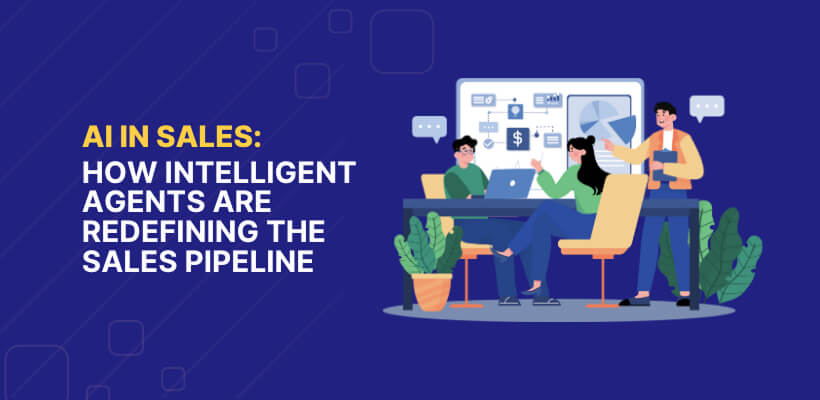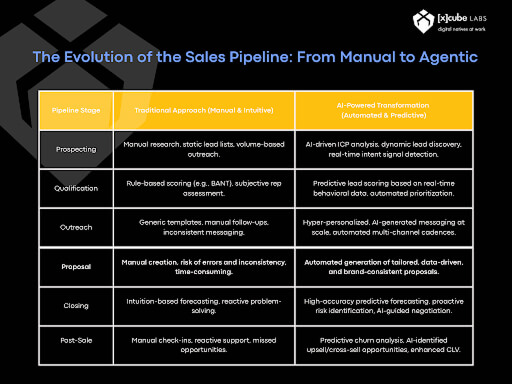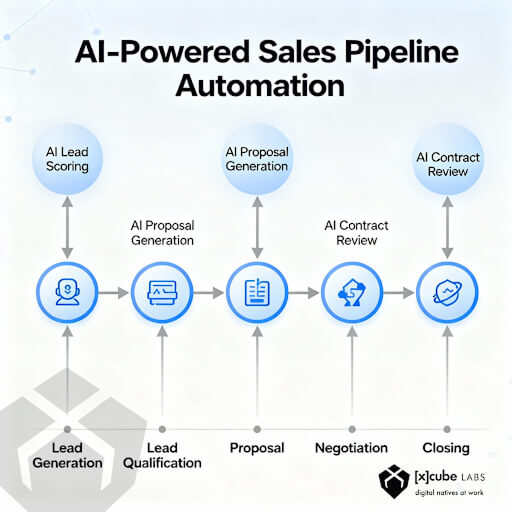 1-800-805-5783
1-800-805-5783 
With AI in sales adoption jumping from 39% to an impressive 81% in just two years, intelligent agents are no longer a futuristic concept as they’re reshaping sales pipelines across industries and delivering measurable results that traditional methods simply cannot match.
Modern sales teams face mounting pressure to do more with less while maintaining personalized customer experiences at scale.
AI in sales provides the solution, with companies investing in AI sales solutions reporting revenue increases of 13-15% and sales ROI improvements of 10-20%.
This dramatic shift represents more than just technological advancement; it’s a fundamental reimagining of how sales processes operate.

AI in sales has evolved far beyond basic automation tools to encompass sophisticated intelligent agents capable of autonomous decision-making and executing complex tasks.
These agentic AI in sales systems now function as self-directed assistants that can follow complex workflows, set goals, plan, implement, and learn independently with minimal human input.
The capabilities of modern intelligent agents extend across the entire sales funnel. Generative AI in sales enables these systems to create unique, context-specific content, insights, and recommendations in real time.
Unlike traditional AI that focuses primarily on automating repetitive tasks, generative AI in sales empowers businesses to generate personalized messaging, product descriptions, and sales proposals tailored to specific customers or industries.
AI in B2B sales environments particularly benefits from these advanced capabilities. By 2026, B2B sales teams utilizing GenAI-embedded tools will reduce the time spent on prospecting and meeting preparation by more than 50%.
This efficiency gain allows sales representatives to focus on what matters most: building relationships and closing deals.
One of the most significant applications of AI in sales is revolutionizing lead generation and qualification processes.
Traditional lead generation methods often result in sales representatives wasting approximately 40% of their time on leads that never convert, costing companies between $10,000 and $30,000 per sales representative annually.
Intelligent agents solve this challenge through sophisticated lead scoring mechanisms. AI in sales examples demonstrate remarkable success rates, with companies utilizing AI-based lead scoring experiencing a 50% increase in lead-to-sale conversion rates.
Machine learning algorithms analyze historical CRM and behavioral data to identify patterns that truly correlate with conversions, surpassing simple manual scoring methods.
The role of AI in sales, particularly in lead qualification, extends to real-time prospect analysis. AI sales agents can instantly analyze website visitors, track engagement patterns, and score leads based on multiple data points, including demographic information, behavioral patterns, and firmographic data.
This comprehensive approach enables sales teams to prioritize high-potential opportunities with unprecedented accuracy.
Using AI in sales for lead qualification has produced impressive results across various industries.
The Waiver Group, a healthcare consulting firm, implemented an AI-powered chatbot that resulted in significantly improved lead qualification processes. Their intelligent agent handled initial engagement, data collection, lead scoring, and follow-up nurturing, allowing human sales representatives to focus on the most promising opportunities.

The modern customer expects personalized experiences, with 71% of consumers anticipating companies to deliver customized interactions.
AI in sales and marketing addresses this challenge by enabling hyper-personalization at previously impossible scales. While traditional personalization methods struggle with scalability, AI automation in sales makes it possible to create tailored experiences for thousands of prospects simultaneously.
AI in sales examples showcase the power of intelligent personalization. Companies implementing AI-driven personalization strategies report 10-15% increases in conversion rates.
The technology analyzes vast amounts of customer data, including past purchase history, browsing behavior, social media interactions, and demographic information, to create highly personalized messages and recommendations.
Generative AI in sales particularly excels in content personalization. These systems can automatically generate targeted sales copy, product descriptions, and proposals tailored to specific customers or industries.
This capability reduces content creation time while ensuring communications remain consistent, relevant, and aligned with brand voice across all channels.
The impact of personalized approaches extends beyond immediate conversion improvements. Netflix’s AI-powered recommendation engine demonstrates how intelligent personalization drives long-term engagement and customer retention.
Similar principles applied to AI in B2B sales environments result in stronger client relationships and increased customer lifetime value.
Predictive analytics represents another frontier where AI in sales delivers transformative results.
Modern AI systems move beyond simple prediction to create sophisticated models that factor in market trends, customer behavior, and global economic factors.
This evolution enables sales teams to make data-driven decisions with unprecedented accuracy.
AI automation forecasting has achieved remarkable precision levels. Advanced AI models can deliver forecasting accuracy rates of up to 95% by analyzing historical data and market signals.
This level of precision enables better strategic planning, resource allocation, and quota setting across sales organizations.

The predictive capabilities extend to identifying customer behavior patterns and purchase intent.
Using AI in sales for predictive lead scoring, companies report 79% increases in conversion rates.
AI algorithms analyze various data points to predict which leads are most likely to convert, enabling sales teams to allocate resources more effectively.
The emergence of autonomous AI agents marks a significant evolution in AI in sales capabilities.
These agents function as independent digital teammates rather than simple tools, capable of noticing situations, making decisions, and taking action with minimal human oversight.
Agentic AI in sales handles complex multi-step processes autonomously. These systems can research prospects, locate contact information, customize outreach, and manage communication timing without constant human guidance.
Their goal-loop architecture enables them to sense and respond to their environment until they complete assigned tasks.
AI in sales examples of autonomous execution include comprehensive lead management workflows.
AI agents can identify ideal prospects, analyze web searches and email communications, create account plans, and execute prospecting sequences. When prospects show strong purchase intent, the system seamlessly hands them over to human sales representatives.
The results from autonomous AI implementation are compelling.
Companies deploying these systems report 35% increases in qualified leads, 20% reductions in time spent on lead qualification tasks, and 15% improvements in lead conversion rates.
These efficiency gains free sales representatives to focus on relationship building and deal closing.
The practical impact of AI in sales is best understood through concrete success stories.
Manufacturing companies implementing AI-powered lead scoring have achieved 25% increases in qualified leads and 30% reductions in time spent on non-revenue generating activities.
These improvements translate directly to bottom-line results, with revenue growth accelerating by 12% compared to previous periods.
SaaS companies leveraging generative AI report even more dramatic results. The implementation of AI-driven personalization and predictive analytics has yielded a 40% increase in pipeline velocity.
These organizations achieve faster deal closure and higher conversion rates by combining intelligent lead scoring with personalized engagement strategies.
Financial services firms that utilize AI-driven predictive analytics have experienced significant improvements in sales efficiency.
One implementation resulted in a 30% reduction in time spent on non-revenue-generating activities, a 20% increase in engagement rates with potential clients, and a 12% increase in quarterly revenue.
The ROI metrics for AI automation in sales consistently demonstrate positive returns. Companies using AI sales tools report average productivity increases of 25-47%, with some organizations seeing sales cycle reductions of up to 22%.
These improvements stem from AI’s ability to automate routine tasks while providing intelligent recommendations for high-value activities.
Modern AI in sales implementations rely on sophisticated technology stacks that integrate multiple AI capabilities.
Machine learning algorithms form the foundation, analyzing vast datasets to identify patterns and predict outcomes.
Natural language processing enables conversational interfaces that can understand and respond to customer queries with human-like accuracy.
Generative AI in sales adds content creation capabilities, automatically producing sales materials, email sequences, and personalized proposals.
These systems integrate with existing CRM platforms, marketing automation tools, and communication systems to create seamless workflows that span the entire sales process.
The integration capabilities of modern AI sales platforms enable comprehensive data analysis across multiple touchpoints.
Systems can analyze CRM data, website behavior, social media interactions, and email engagement to create complete customer profiles that inform personalized sales strategies.
While the benefits of AI in sales are clear, successful implementation requires careful planning and change management.
Organizations must address data quality issues, ensure proper integration with existing systems, and provide adequate training for sales teams adapting to AI-augmented workflows.
Using AI in sales effectively requires a phased implementation approach. Companies achieve better results by starting with specific use cases, such as lead scoring or email automation, before expanding to more complex applications.
This gradual approach allows teams to build confidence and expertise while demonstrating clear ROI.
Training and adoption represent critical success factors. Sales teams must understand how to interpret AI insights, when to rely on automated recommendations, and how to maintain human connection in AI-augmented processes.
Organizations that invest in comprehensive training programs see faster adoption and better results from their AI automation in sales initiatives.
The trajectory of AI in sales points toward increasingly sophisticated autonomous systems capable of handling complex sales scenarios with minimal human intervention.
By 2027, an estimated 95% of seller research workflows are expected to start with AI, representing a significant increase.
Agentic AI in sales will continue evolving toward greater autonomy and decision-making capability, reflecting some of the major agentic AI trends to watch in 2026.
Future systems will handle entire sales sequences from initial prospect identification through contract negotiation while maintaining human oversight for strategic decisions and relationship management.
The competitive implications are significant. Organizations that fail to adopt AI in sales technologies risk falling behind competitors who leverage these capabilities for superior efficiency and customer experience.
The gap between AI adopters and traditional sales organizations will continue to widen as technology becomes more sophisticated and accessible.
Sales leaders must develop comprehensive AI in sales strategies that align with organizational goals and customer expectations.
This includes investing in appropriate technology platforms, developing team capabilities, and establishing metrics to measure AI impact on sales performance.
AI in B2B sales environments requires particular attention to data quality and integration challenges.
Organizations must ensure that their CRM systems contain accurate and comprehensive data that enables practical AI analysis and decision-making.
The human element remains crucial even in AI-augmented sales processes. Successful implementations strike a balance between automation efficiency and human relationship-building capabilities.
Sales representatives must evolve from task executors to strategic advisors who leverage AI insights to deliver superior customer experiences.

The revolution in AI in sales is not coming, it’s here. Organizations that embrace intelligent agents and AI automation are already seeing significant improvements in efficiency, revenue, and customer satisfaction.
As these technologies continue to advance, the question is not whether to adopt AI in sales, but how quickly organizations can implement these transformative capabilities to maintain a competitive advantage in an increasingly AI-driven marketplace.
The evidence is overwhelming: AI in sales delivers measurable results across all aspects of the sales process.
From lead generation and qualification to personalized outreach and predictive analytics, intelligent agents are redefining what’s possible in modern sales operations.
The organizations that act decisively to implement these technologies will be the ones setting the pace in tomorrow’s sales landscape.
1. How do I use AI in sales?
You can use it for intelligent lead scoring, creating personalized emails and proposals at scale, getting highly accurate sales forecasts, and automating outreach sequences.
2. Why use AI in sales?
It delivers significant results, boosting revenue by 13-15% and sales ROI by 10-20% while automating routine tasks so your team can focus on closing deals.
3. How does AI help with leads?
AI intelligently scores leads to find prospects who are most likely to buy, increasing conversion rates by up to 50% and focusing your team’s efforts.
4. Will AI replace sales reps?
No, it empowers them. AI handles repetitive tasks, freeing up sales reps to focus on strategic relationship-building and closing complex deals.
5. How accurate is AI for sales forecasting?
Very accurate. Advanced AI models can achieve up to 95% forecasting accuracy, resulting in significantly improved strategic planning and resource allocation.
6. How can AI help me prospect in sales?
AI automates research to identify high-potential leads. It analyzes data to predict who is most likely to buy, finds contact information, and customizes initial outreach, which can reduce time spent on prospecting by over 50%.
7. How can I use AI in a field sales business?
For field sales, AI helps optimize your time and resources. It can score leads in your territory to help you prioritize visits, automate pre-meeting research, and handle follow-up communications, allowing you to focus on face-to-face selling.
At [x]cube LABS, we craft intelligent AI agents that seamlessly integrate with your systems, enhancing efficiency and innovation:
Integrate our Agentic AI solutions to automate tasks, derive actionable insights, and deliver superior customer experiences effortlessly within your existing workflows.
For more information and to schedule a FREE demo, check out all our ready-to-deploy agents here.